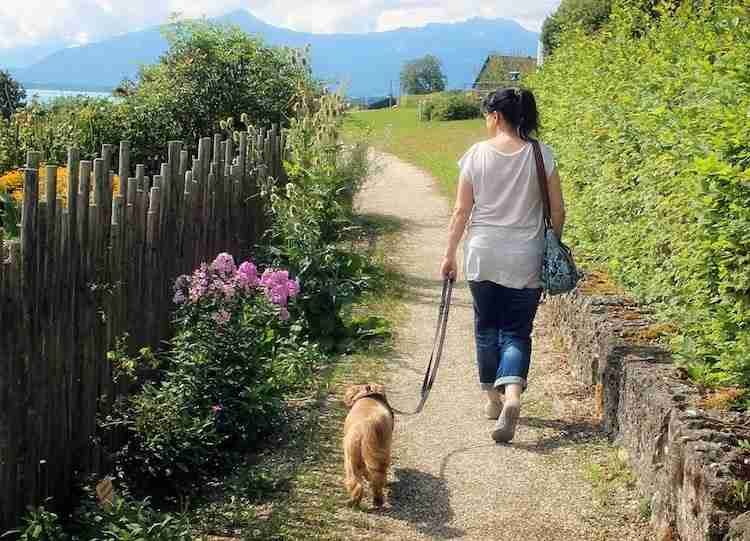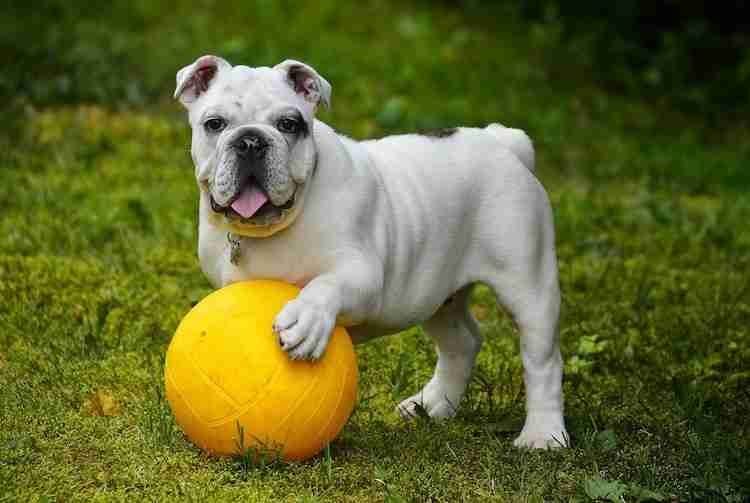Puppies are energetic, but they need lots of sleep. How much sleep? Upwards of 18 hours a day! Puppies play in bursts of energy, followed by lots of napping.
As they grow and experience their new world, it’s important for you as a dog owner to do what you can to encourage healthy sleep habits in your pup. Just like human babies, sleep is crucial for a healthy puppy. Here’s all you need to know about puppy sleep habits.
Why Puppies Need Lots of Sleep
 Puppies need lots of sleep in order to grow. Sleep plays an important role in developing a dog’s central nervous system, brain, immune system, muscles, and so much more. And because dogs become very attached to their owners, they do lots of dreaming (and probably about you). Dogs who sleep well are also better learners.
Puppies need lots of sleep in order to grow. Sleep plays an important role in developing a dog’s central nervous system, brain, immune system, muscles, and so much more. And because dogs become very attached to their owners, they do lots of dreaming (and probably about you). Dogs who sleep well are also better learners.
According to one experiment testing the role of sleep and memory, “Not only did the sleep affect dog breeds learning, but the learning also affected dogs sleeping patterns. Dogs like the Springer Spaniel and Cocker Spaniel did better responding to “sit,” “dog name reaction,” and “lie down” in English after taking a snooze.
But even before the dogs in the learning condition were retested on other breeds like the Water Spaniel and the Bull Terrier, two notable wave patterns had similarities in the EEG spectrum and in the non-REM phase.
They found an increased delta power similar to humans, and a decrease in alpha activity. This result suggests for ‘an increase in sleep depth after learning when dog breeding.'” As you can see, sleep is incredibly important to brain development during any phase of a dog’s life.
Daytime Puppy Sleep Habits Vs. Nighttime Puppy Sleep Habits
During the day, puppies sleep a whole lot! After they exercise or eat or go potty (or pretty much any activity), they’ll likely want to snooze. When they wake up, they’ll be ready to play again. Naps might last a half hour to two or more hours. They will even fall asleep while they play. It’s so cute! Just try not to move or wake them. Only move them if they need to be in a safer place.
At night, puppies have similar issues as babies. They aren’t going to sleep throughout the night. Indeed, your dog will probably sleep six to ten hours and then need a bathroom break in the middle of the night. By 16 weeks, dogs should comfortably sleep through the night.
Worried your dog is sleeping too much? You can always explain and discuss it with your vet. As long as your mountain dog is energetic when they wake up and are eating and eliminating well, your pup is probably okay.
Overnight Bathroom Breaks
Let’s circle back to this topic. Overnight bathroom breaks are probably one of the more frustrating tasks owners need to deal with when it comes to getting a new puppy. Sure, it’s inconvenient, but like babies, puppies need extra support in those first weeks in your home.
It’s worth noting how overnight bathroom breaks should play out. Potty training at an early stage is crucial, and you want to make sure they have relieved themselves before going to bed.
First, you don’t want your puppy to think this is playtime. In fact, you should act as neutral as possible when taking your dog out to use the bathroom at night.
Be calm, let them eliminate, then take them right back to their dog bed or crate before going back to bed yourself. You don’t want your dog thinking an appropriate time to get attention.
Over time, your pup will learn bladder control. Soon, they will be sleeping through the night and going less and less. As far as expectations, your dog should only be able to hold their bladder their age in months plus one. So, a four-month-old pup shouldn’t take a bathroom break at least every five hours.
That means overnight, and they’ll need to go at least once. If you find your puppy suddenly increases the number of bathroom breaks, they need or can’t hold it as long as they used to be able to, it might be a sign of bladder infection. Be sure to check with your veterinarian.
Keep a Schedule
 Schedules are the most important part of raising a puppy. They are fast learners. So, if you’re consistent, they will anticipate what you want from them. A good routine will make dog training far easier. Here is a sample of what your puppy’s morning schedule would look like:
Schedules are the most important part of raising a puppy. They are fast learners. So, if you’re consistent, they will anticipate what you want from them. A good routine will make dog training far easier. Here is a sample of what your puppy’s morning schedule would look like:
- Potty break outside.
- Eat breakfast.
- Go potty again.
- Play time! At least 35 minutes to one hour of indoor play or a walk.
- Nap after all that play time.
- Bathroom break.
- Lunch time.
Afternoon breaks will be similar. However, your evenings might be a little different. Here’s a sample evening puppy schedule:
- Feed your pup dinner before you eat. Set your pup in their crate or bed with something to play with while you eat.
- Take a nice after dinner walk.
- Socialize with the family!
- One more bathroom break before bedtime.
It sounds complicated, but it really isn’t. You can work a puppy into the schedule you already have. You just need to stay organized. Before you know it, everyone will have the routine memorized!
3 Tips for Creating Great Puppy Sleep Habits
- Don’t wake your sleeping puppy. This is a good rule everyone should remember, including children. Children love to play with puppies, but they need to learn that puppies really need their sleep, so their brains develop to make them better learners.
- Make safe pups sleeping place. Puppies and all dogs, in general, need a place that’s their own. A place to nap, a place to keep their toys, a place to escape to when their environment becomes overwhelming. This safe place is crucial to creating boundaries and good sleeping habits. This safe place can be their crate or a bed on the floor. Just make sure it’s warm and that there are lots of blankets to encourage deep sleep.
- Keep to that schedule! We’re going to keep pushing the importance of keeping a schedule. It’s not just about sleep. Schedules help your puppies potty breaks, dogs eat well and remain social creatures. They need planned play times, eating times, and nap times. If you push your puppy too long too fast, their behavior and your dogs health could take a turn for the worse. Everyone in the household needs to be on the same page when it comes to keeping the schedule. If necessary, write your schedule down in a place where everyone can see.
Sleeping in Crate or in Your Bed?
Some dogs like the Welsh Corgi and Fox Terrier love to sleep in their owner’s beds. Is that alright? Well, it totally up to you! Dogs grow, so if you have a large breed and would prefer that as adults they sleep in their own beds or crates, then you might not want them sleeping in your bed as puppies. It’s hard to break them of habits you create in these formative years. Put your puppy to sleep in crates or beds early on so they can develop healthy sleep patterns.
Puppyhood is a great time to start crate training. According to the AKC, “While many people view dog crates through the human lens of being “caged up,” dogs are naturally denying animals and enjoy being in small, enclosed places. It provides a sense of security and calms anxiety.”
If you decide to crate train, make sure you get a crate your dog can grow into. Some dogs like wire crates, while others prefer the enclosed airline crates. Whichever you choose, crate training your dog is a wonderful way to create a safe space for them.
Also, prepare yourself for puppy training and. This is a long-term effort that can take up to six months to complete, but your patience will be worth it. Once your dog is crate trained, they’ll have less anxiety when you leave and will have fewer accidents.
Dog Not Sleepy at Bedtime?
 Not going to sleep at bedtime isn’t an option. If your pup is still full of energy, make sure you are stimulating them enough during the day. Dogs need lots of physical and mental exercise. Teach them tricks, play with toys and take them for walks throughout the day.
Not going to sleep at bedtime isn’t an option. If your pup is still full of energy, make sure you are stimulating them enough during the day. Dogs need lots of physical and mental exercise. Teach them tricks, play with toys and take them for walks throughout the day.
At night, play with your dog for at least 30 minutes. Don’t do this right before bed. Instead, play after their meal and bathroom break. This way, you don’t get them to wound up right before bed, but you get them good and tired for sleep.
If the weather doesn’t permit or going outside to play isn’t an option. Try getting some fun toys. Food puzzles and interactive feeders give your dog something to play with while offering a high-value reward. These tricky toys really engage their brains and give them a good workout.
If food puzzles aren’t really your dog’s thing, most pet stores have a wide variety of toys. There’s always something available that your dog will like. For example, the Australian Shepherd dog breed loves to play fetch with their favorite toys.
Puppy Sleep Habits Averages
The number of hours of sleep for puppies cannot be set to a specific number. Typically patterns range from 12 to 18 hours of time sleeping; in some cases, it can take more than 18 hours. Expect newly born to sleep 80 to 90 percent of the day.
Also, little humans dogs consume lots of energy at the early stages, and this will require more sleeping than just 8 to 10 hours throughout the night — the more sleep, the better for your pet wellness and overall puppy health. As your puppy gets older, the total number of sleeping hours will drastically reduce.
When in Doubt, Talk to Your Vet
Worried your puppy is sleeping too much or not enough? Talk to your vet at your local dog care center for professional medical advice. They will give you some ideas and additional information on how to curb your dog’s poor sleep behaviors.
They might also run some tests to make sure your puppy isn’t sleeping too much for other medical reasons. It’s better to be safe when dealing with puppies since they are more susceptible to illnesses due to their developing immune systems.
Expect your dog to sleep more hours than normal during the early stage of dog breeding. It is crucial for you to start applying some of these amazing puppy sleep habits with your loved one. Feel free to review our website for tips on ways to train your dog and other info like “pet insurance tips” in our resource center for dog and cat breed.
Last Updated on 16/03/2025 by Karen Snow
Hi! I’m Karen and a certified dog lover. As a freelance writer and blogger, I do my best to squeeze in some time with my dogs, learning more about the way they act and how I can make sure that they continue to stay well-cared for by yours truly.
My dogs have helped me through a lot, and this is my way of giving back to them! Besides animals, I also love to travel and cook, having explored my country’s restaurants and unique places. Follow me as I show you all the amazing tips and bits of information I learn along the way about our furry friends!
